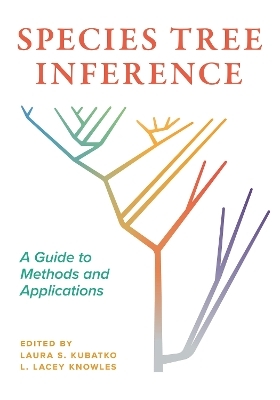
Species Tree Inference
A Guide to Methods and Applications
Seiten
2023
Princeton University Press (Verlag)
978-0-691-20759-9 (ISBN)
Princeton University Press (Verlag)
978-0-691-20759-9 (ISBN)
An up-to-date reference book on phylogenetic methods and applications for evolutionary biologists
The increasingly widespread availability of genomic data is transforming how biologists estimate evolutionary relationships among organisms and broadening the range of questions that researchers can test in a phylogenetic framework. Species Tree Inference brings together many of today’s leading scholars in the field to provide an incisive guide to the latest practices for analyzing multilocus sequence data.
This wide-ranging and authoritative book gives detailed explanations of emerging new approaches and assesses their strengths and challenges, offering an invaluable context for gauging which procedure to apply given the types of genomic data and processes that contribute to differences in the patterns of inheritance across loci. It demonstrates how to apply these approaches using empirical studies that span a range of taxa, timeframes of diversification, and processes that cause the evolutionary history of genes across genomes to differ.
By fully embracing this genomic heterogeneity, Species Tree Inference illustrates how to address questions beyond the goal of estimating phylogenetic relationships of organisms, enabling students and researchers to pursue their own research in statistically sophisticated ways while charting new directions of scientific discovery.
The increasingly widespread availability of genomic data is transforming how biologists estimate evolutionary relationships among organisms and broadening the range of questions that researchers can test in a phylogenetic framework. Species Tree Inference brings together many of today’s leading scholars in the field to provide an incisive guide to the latest practices for analyzing multilocus sequence data.
This wide-ranging and authoritative book gives detailed explanations of emerging new approaches and assesses their strengths and challenges, offering an invaluable context for gauging which procedure to apply given the types of genomic data and processes that contribute to differences in the patterns of inheritance across loci. It demonstrates how to apply these approaches using empirical studies that span a range of taxa, timeframes of diversification, and processes that cause the evolutionary history of genes across genomes to differ.
By fully embracing this genomic heterogeneity, Species Tree Inference illustrates how to address questions beyond the goal of estimating phylogenetic relationships of organisms, enabling students and researchers to pursue their own research in statistically sophisticated ways while charting new directions of scientific discovery.
Laura S. Kubatko is Professor of Statistics and of Evolution, Ecology, and Organismal Biology at The Ohio State University. L. Lacey Knowles is the Robert B. Payne Collegiate Professor of Ecology and Evolutionary Biology and Curator of Insects at the University of Michigan. They are the coeditors of Estimating Species Trees: Practical and Theoretical Aspects.
| Erscheinungsdatum | 10.05.2023 |
|---|---|
| Co-Autor | Paul D. Blischak, Jeremy M. Brown, Zhen Cao |
| Zusatzinfo | 101 b/w figures. 6 tables. |
| Verlagsort | New Jersey |
| Sprache | englisch |
| Maße | 178 x 254 mm |
| Themenwelt | Naturwissenschaften ► Biologie ► Evolution |
| Naturwissenschaften ► Biologie ► Ökologie / Naturschutz | |
| ISBN-10 | 0-691-20759-3 / 0691207593 |
| ISBN-13 | 978-0-691-20759-9 / 9780691207599 |
| Zustand | Neuware |
| Informationen gemäß Produktsicherheitsverordnung (GPSR) | |
| Haben Sie eine Frage zum Produkt? |
Mehr entdecken
aus dem Bereich
aus dem Bereich
Komplette Neuübersetzung. Mit einem Nachwort von Josef H. Reichholf.
Buch | Hardcover (2018)
Klett-Cotta (Verlag)
48,00 €


